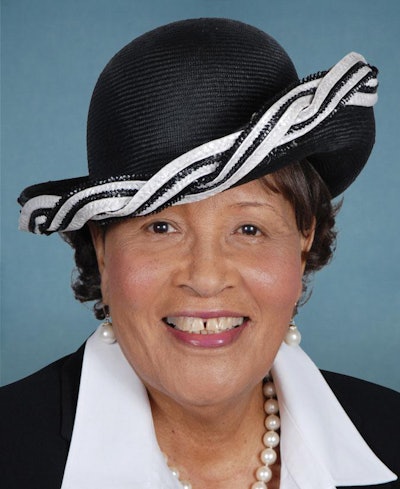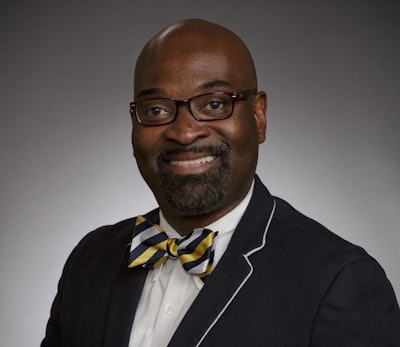Historically Black colleges and universities continue to be needed and relevant. That was the sentiment expressed by higher education and political leaders who convened virtually on Wednesday to participate in Virginia Union University’s (VUU) “The Continuing Significance of HBCUs Today” event.
“I was made aware first-hand just how HBCU education can turn dreams into realities,” said United States Congresswoman Dr. Alma S. Adams of N.C. “Because of these experiences throughout my career, I have worked to ease the burdens that prevent students of color from accessing a quality education.”
 Congresswoman Alma S. Adams
Congresswoman Alma S. AdamsIn 2015, Adams, a former professor at Bennett College, founded the Congressional Bipartisan HBCU Caucus to create a national dialogue, educate members of Congress and establish bipartisan legislation to address the needs of HBCUs.
Adam’s said that her advocacy for HBCUs first stemmed from her own education at North Carolina Agricultural and Technical State University.
“[N.C. A&T] took a poor Black girl from the ghetto of New Jersey, [that] was not prepared fully for college work but saw something and made an investment in me,” she said. “They molded and shaped me into what they knew I could become.”
Though HBCUs only make up 3% of all postsecondary institutions, they educate 80% of all Black judges and lawyers, 50% of all Black doctors, one-fifth of all Black CEOs and about one-third of Black individuals who hold a science, technology, engineering and mathematics (STEM) degree, according to Dr. Terrell Strayhorn, associate provost for research, innovation and graduate education and professor of urban education at VUU.
“You are seeing that now with so much that’s going on in our country that these kids have options and they are choosing HBCUs first,” said Dr. Melva Williams, vice chancellor for student affairs and enrollment management at Southern University at Shreveport. “We are nobodies second chance, nobodies afterthought. In this day and age, our best and brightest are choosing HBCUs.”
To help frame and shape HBCU stories, the United Negro College Fund (UNCF) launched the “HBCU Effect.” This initiative analyzes HBCUs’ impact on the social, economic, educational and cultural aspects of American communities.
“There’s too much negativity out there,” said Dr. Brian K. Bridges, vice president of research and member engagement at UNCF. “Even though that has shifted a bit here lately, even when you get good stories out there about HBCUs, there are always people who are trying to shoot them down. Our way of helping to counter the negative narrative that persists about HBCUs, is to frame it using this HBCU Effect terminology.”
In the age of COVID-19, HBCUs and Black Americans have been disproportionately impacted.
According to APM Research Labs, the COVID-19 death rate has been 80.4 per 100,000 for Black Americans. This is more than twice the rate compared to White and Asian Americans.
However, many HBCUs, such as Meharry Medical College, have led the way in conducting COVID-19 vaccine research.
“It will be our students who will lead our communities out of this recession, I believe,” said Adams. “We’ve got to really be advocates for our schools and for our students,” she added. “We’ve got to understand that HBCUs must succeed. They must not only survive, but they must thrive.”
 Dr. Fred A. Bonner II
Dr. Fred A. Bonner IITo assist HBCUs financially, Bridges suggested that more investments should come from philanthropists, not just from the federal and state governments. Those investments include more student support for mental and financial stability, virtual transition support and stabilization investments.
However, federal investments should aim to increase maximum Pell grants awards, reduce the student loan debt burden and invest in HBCU infrastructure, said Adams.
She highlighted the HBCU Capital Financing Program, which provides “low-cost capital loans for HBCUs trying to rebuild, particularly the infrastructure, [when] the debt obligation is too much, particularly for our smaller schools.”
Though the Coronavirus Aid, Relief, and Economic Security (CARES) Act provided initial aid, Williams stressed that continual funding is necessary to “help students navigate college throughout this unforeseen challenge that we are in.”
The digital divide also became more apparent during the transition to remote learning. On campus, students are provided with libraries and community labs. However, when students are required to complete coursework online, they might not have access to those similar resources, said panelists.
“Our students were sent home with parents who were probably essential workers and working on the frontlines and their little brothers and sisters who were also working from home,” said Williams. “Having seen all five of [Southern University System’s] campuses just really try to figure it out, at such a neck breaking pace was difficult.”
Bridges emphasized that HBCUs are continuing to advance their value by prepping the next generation of leaders.
“I always wonder who on the campus is going to be the next Kamala Harris or who on the campus will be the next Alice Walker,” he said. “Or who on the campus will be the next Stacey Abrams. They are continuing that legacy of preparing leaders that are concerned about their communities and give back to their communities.”
Adams said HBCUs invest not only in the learning of their students but also “create a sense of purpose and identity.”
“The college experience must be a full experience, it must be broad,” she added. “Yes, it is about education but it’s also about making sure that you develop as a full person.”
Additionally, Dr. Fred A. Bonner II, professor and endowed chair of educational leadership and counseling at Prairie View A&M University (PVAMU), said that HBCUs hold the important function of providing narrative and voice. However, they “must maintain dominion over [their] narrative.”
“You can have an opinion about the Black narrative, about the Black experience, about the Black college, but you should never have dominion over those narratives,” said Bonner, who is also the executive director of the Minority Achievement, Creativity and High Ability Center (MACH-III) at PVAMU. “Because we have too many people from our community, too many of our ancestors, too many of our forefathers, foremothers who we stand on their shoulders of excellence. And I think it does a disservice to their legacy when we don’t allow ourselves to tell our own narratives about who we are, what these magnificent colleges are and what they have been and what they have historically meant to our particular communities.”
Sarah Wood can be reached at [email protected].





















